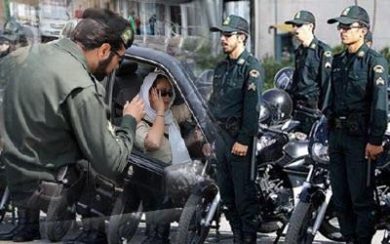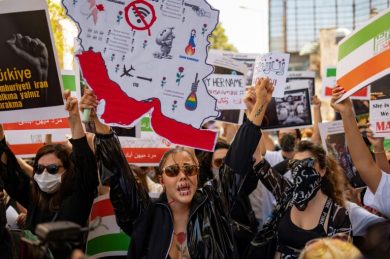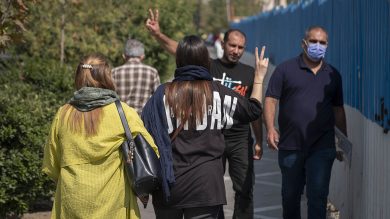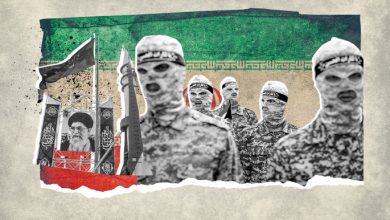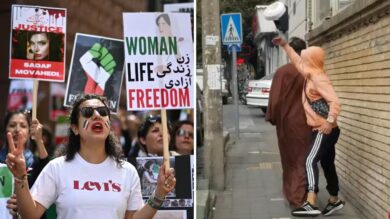The Islamic Revolutionary Guard Corps (IRGC) has established a vast network of proxy militias and armed groups across the Middle East, enabling Iran to exert influence and destabilize regional security. This proxy network, managed primarily through the Quds Force, has been instrumental in supporting Iran’s geopolitical ambitions while allowing the regime to engage in asymmetric warfare without direct confrontation. Through funding, training, and arms supplies, the IRGC empowers militant groups to prolong conflicts, conduct terrorist operations, and undermine rival governments. These actions have exacerbated crises in countries like Syria, Iraq, Yemen, and Lebanon, with far-reaching consequences for both regional and global security. This article analyzes the IRGC’s proxy strategy, the groups it supports, and the resulting impact on regional stability.
1. The IRGC’s Proxy Strategy
The IRGC’s strategy is based on asymmetric warfare, using proxy groups to fight on Iran’s behalf while avoiding direct conflict with stronger adversaries, such as the United States and Israel. By operating through proxies, Iran achieves several key objectives:
• Expanding its regional influence without direct military involvement.
• Weakening rival states by supporting internal conflicts and insurgencies.
• Gaining leverage in diplomatic negotiations by threatening regional security.
The Quds Force, led until 2020 by General Qassem Soleimani, oversees these operations, coordinating with proxy leaders across multiple countries.
2. Key IRGC-Backed Proxies and Their Role
A. Hezbollah (Lebanon)
• Founded in the 1980s with IRGC support, Hezbollah is Iran’s most powerful proxy.
• The group operates as both a militant organization and a political force in Lebanon, effectively controlling large parts of the country.
• Military Activities:
• Launches rocket attacks on Israel and engages in cross-border skirmishes.
• Supports Iran’s interests in Syria by sending fighters to back the Assad regime.
• Funding and Resources:
• Iran reportedly provides $700 million annually to Hezbollah.
• The group operates smuggling and money-laundering networks to fund its activities.
B. Popular Mobilization Forces (PMF) (Iraq)
• The IRGC backs Shia militias within Iraq’s Popular Mobilization Forces (PMF), which were formed to fight ISIS but have since expanded their role.
• Key IRGC-linked factions, such as Kata’ib Hezbollah and Asa’ib Ahl al-Haq, have carried out rocket and drone attacks on U.S. bases.
• These militias have political influence in Iraq, undermining the country’s sovereignty and democratic processes.
C. Houthis (Yemen)
• The IRGC provides military training, ballistic missiles, and drones to Yemen’s Houthi rebels.
• The Houthis have launched missile and drone attacks on Saudi Arabia and UAE oil infrastructure, destabilizing the Arabian Peninsula.
• This support has prolonged Yemen’s civil war, causing one of the world’s worst humanitarian crises.
D. Hamas and Palestinian Islamic Jihad (Gaza)
• Iran funds and arms Hamas and Palestinian Islamic Jihad, militant groups operating in the Gaza Strip.
• These groups frequently launch rocket attacks on Israeli civilians and engage in terror operations.
• The IRGC’s support strengthens Iran’s position in the Israeli-Palestinian conflict.
3. IRGC Operations in Syria
The IRGC has been a key player in Syria’s civil war, providing military support to the Assad regime since 2011. Its objectives in Syria include:
• Maintaining a strategic corridor to Hezbollah in Lebanon.
• Establishing military bases near Israel’s border to pose a direct threat.
• Using foreign militias, such as the Fatemiyoun Brigade (Afghan fighters) and Zainabiyoun Brigade (Pakistani fighters), to expand its influence.
The IRGC’s presence has prolonged the conflict, contributing to war crimes and mass displacement.
4. The Impact of the IRGC’s Proxy Network on Regional Stability
A. Prolonged Conflicts and Humanitarian Crises
• The IRGC’s proxies have escalated conflicts in Yemen, Syria, and Iraq, preventing peace settlements and worsening humanitarian conditions.
• Millions have been displaced, and civilian casualties continue to rise due to proxy-driven violence.
B. Sectarian Tensions
• The IRGC exploits sectarian divisions to strengthen its proxies, fueling Sunni-Shia conflicts across the region.
• This strategy has deepened instability in Iraq, Lebanon, and Syria, making reconciliation more difficult.
C. Threats to Global Security
• The IRGC’s proxies target U.S. military forces, diplomatic missions, and critical infrastructure in the Middle East.
• Hezbollah’s global network has been linked to terrorist plots and criminal activities in Latin America, Africa, and Europe.
5. International Efforts to Counter the IRGC
A. Sanctions and Diplomatic Pressure
• The United States has designated the IRGC as a Foreign Terrorist Organization (FTO) and imposed extensive sanctions on its leadership and proxies.
• The European Union and other countries have implemented targeted sanctions but have yet to adopt a full terrorist designation for the IRGC.
B. Military and Cyber Countermeasures
• The U.S. and Israel have conducted airstrikes on IRGC assets in Syria and Iraq to disrupt arms shipments and military build-ups.
• Enhanced cybersecurity measures are being developed to counter IRGC cyberattacks and disinformation campaigns.
6. Recommendations for Action
To mitigate the IRGC’s destabilizing influence, the international community should:
1. Expand Sanctions
• Target financial networks and front companies used to fund proxy groups.
• Increase coordination between allies to close sanction loopholes.
2. Designate the IRGC as a Terrorist Organization
• Broader terrorist designations would limit the IRGC’s ability to operate globally.
3. Support Regional Partners
• Provide military and intelligence support to countries threatened by IRGC proxies, such as Iraq, Israel, and Saudi Arabia.
4. Promote Political Stability
• Support democratic institutions and reconciliation efforts to counter the IRGC’s influence in conflict zones.
Conclusion
The IRGC’s global proxy network is a major threat to Middle Eastern stability and global security. By supporting militant groups, Iran has prolonged conflicts, fueled sectarian tensions, and undermined peace efforts. A coordinated international response—including sanctions, military countermeasures, and political support—is essential to contain the IRGC’s ambitions and promote stability in the region.
Join Our Newsletter!
Stay informed with the latest updates, news, and ways to take action in the fight for justice and global security. Sign up now to get updates delivered straight to your inbox!

